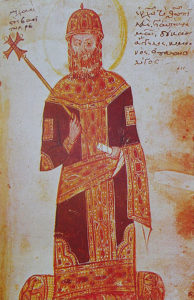Michael VIII Palaiologos Personality Type
Byzantine emperor from 1261 to 1282
Michael VIII Palaiologos or Palaeologus (Greek: Μιχαὴλ Δούκας Ἄγγελος Κομνηνὸς Παλαιολόγος, romanized: Mikhaēl Doukas Angelos Komnēnos Palaiologos; 1223 – 11 December 1282) reigned as the co-emperor of the Empire of Nicaea from 1259 to 1261, and as Byzantine emperor from 1261 until his death. Michael VIII was the founder of the Palaiologan dynasty that would rule the Byzantine Empire until the Fall of Constantinople in 1453. He recovered Constantinople from the Latin Empire in 1261 and transformed the Empire of Nicaea into a restored Byzantine Empire. His reign saw considerable recovery of Byzantine power, including the enlargement of the Byzantine army and navy. It would also include the reconstruction of the city of Constantinople, and the increase of its population. Additionally, he re-established the University of Constantinople, which led to what is regarded as the Palaiologan Renaissance between the 13th and 15th centuries.It was also at this time that the focus of the Byzantine military shifted to the Balkans, against the Bulgarians, leaving the Anatolian frontier neglected. His successors could not compensate for this change of focus, and both the Arsenite schism and two civil wars which occurred from 1321–1328 and 1341–1347 undermined further efforts toward territorial consolidation and recovery, draining the empire's strength, economy, and resources. Regular conflict between Byzantine successor states such as the Empire of Thessalonica, Trebizond, Epirus and Serbia resulted in permanent fragmentation of former Byzantine territory and opportunity for increasingly successful conquests of expansive territories by post-Seljuk Anatolian beyliks, most notably that of Osman, later called the Ottoman Empire.

